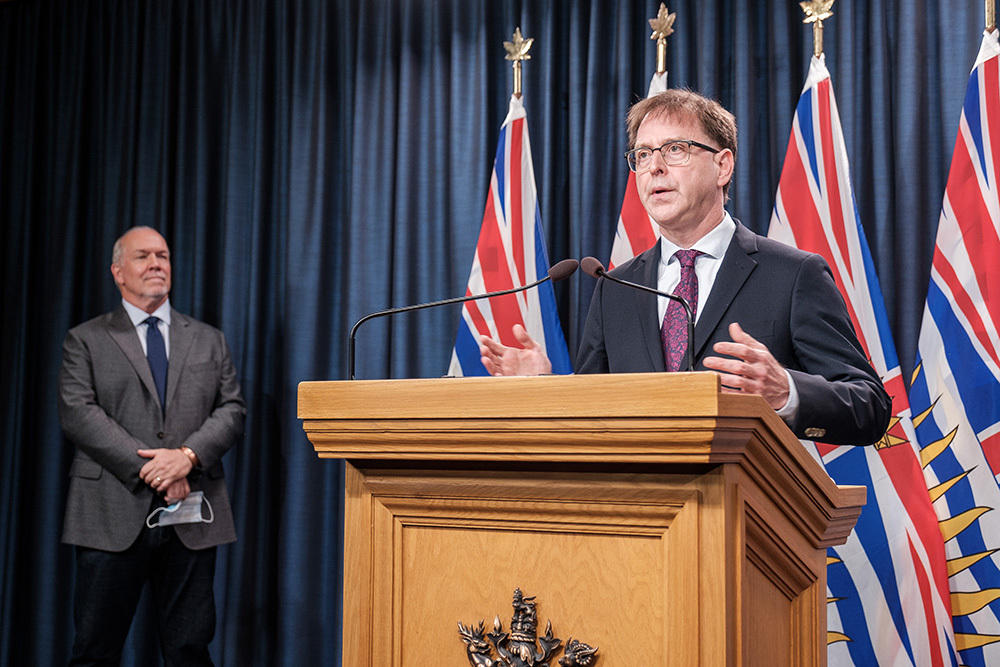After three days of record new COVID-19 cases, B.C. public health officials are urging people to follow orders limiting social gatherings to six guests from outside a household.
The province has identified 1,120 new cases of COVID-19 since Friday, with 830 cases, or 74 per cent, in the Fraser Health region.
There were 352 new cases on Saturday, a new record of 389 on Sunday and 379 new infections on Monday. All three days topped the previous record, from Oct. 24, of 317 new cases.
Hospitalizations are also up by 12 to 90 people. The number of people in critical care dropped from 25 to 19 over the weekend.
“These numbers are concerning for all of us,” said deputy provincial health officer Dr. Réka Gustafson, who stood in for Dr. Bonnie Henry today. “But we have learned a lot about living with COVID-19.”
Last week, Henry instituted a new order limiting social gatherings in private homes to the household’s same “safe six” individuals in response to what she said was significant community transmission through these events.
Fraser Health CEO Dr. Victoria Lee even encouraged residents in the region not to have any guests from outside the household.
Health Minister Adrian Dix said weekend gatherings of crowds on the Granville Street strip in Vancouver were “disgraceful” and frustrating for people who do follow public health guidelines.
Gustafson said the new limits imposed last week “were in response to ongoing transmission in certain settings.”
Any new guidelines would also be based on evidence of where transmission is occurring, she said. “It’s important for people to know that thought goes into this all the time.”
Alice Fleerackers, a PhD student and researcher in health and science communication at Simon Fraser University said public health officials should be working to engage young adults under 39, who continue to make up a disproportionate number of cases.
“There’s often public communication that treats young people as inherently irresponsible, without addressing why people are having a higher risk,” she said. Many young adults live with multiple roommates, rely on public transit or don’t know how to interpret the COVID-19 guidelines on visiting others.
Health officials lack the information needed to develop campaigns to reach young people, she said.
“We won’t know until we ask people, or we do that research to understand who those people are who impact decisions and who people look to for guidance,” she added. “Before assuming that TikTok is the best place, take some time and listen to youth. Personal messages can be very helpful.”
Dix said the province continues to consult with youth and young people and will work to tailor public guidance to their needs.
Fleerackers would also like to see government provide positive guidance on how young adults can socialize safely. “You can’t just tell us not to do something, without giving us some suggestions of what we can do.”
And tailored and targeted messaging aren’t just for youth.
Two experts in seniors’ health and wellness say that public health officials could do more to engage faith and community leaders in developing messages around ways seniors could connect with their networks and feel supported while reducing the risk of transmission.
Joanie Sims-Gould, an associate professor in the department of family practice at the University of British Columbia, said “faith leaders and other community groups are facing the same barriers and tend to just rely on technology to fill that gap.”
But it’s important that “faith and community and businesses are all echoing that public health advice,” she said.
Sims-Gould said small things, like organizing letter-writing and phone calls to seniors, can provide connection without risk.
Gloria Gutman, former director of the Gerontology Research Centre and department of gerontology at Simon Fraser University, echoed Sims-Gould’s advice.
And she noted that faith and community groups have an opportunity to communicate with youth about the importance of protecting the most vulnerable in their communities.
“I can’t imagine a deity that would want people together right now,” said Gutman. “Faith needs to help build solidarity, and it is an opportunity to bridge the generations in the sense that young people should act for their communities.”
While the impact of last week’s orders won’t be seen for at least another week, Dix urged all British Columbians to adhere to public guidance and to err on the side of caution.
“We’re facing COVID-19 for a long time to come, for months and months... to come and for us to do all the things that we want, to have children in schools, to have surgeries performed, to have businesses open, to have some normalcy in these times, we need to follow public health guidance,” he said. ![]()
Read more: Coronavirus
















Tyee Commenting Guidelines
Comments that violate guidelines risk being deleted, and violations may result in a temporary or permanent user ban. Maintain the spirit of good conversation to stay in the discussion.
*Please note The Tyee is not a forum for spreading misinformation about COVID-19, denying its existence or minimizing its risk to public health.
Do:
Do not: